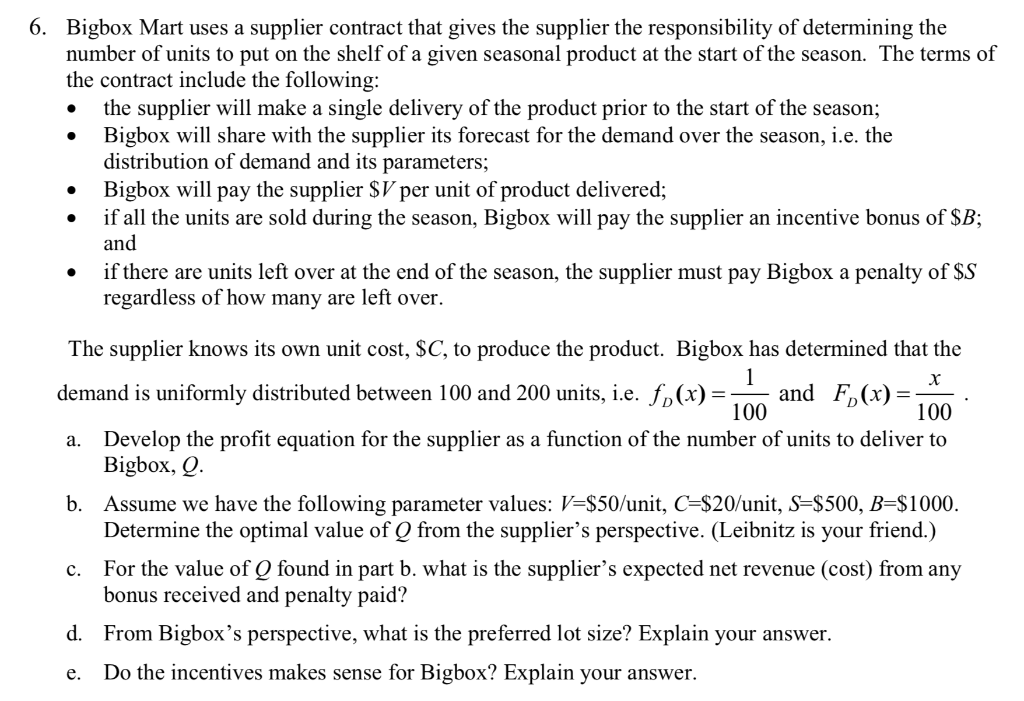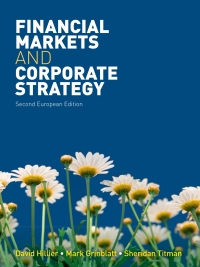
. 6. Bigbox Mart uses a supplier contract that gives the supplier the responsibility of determining the number of units to put on the shelf of a given seasonal product at the start of the season. The terms of the contract include the following: the supplier will make a single delivery of the product prior to the start of the season; Bigbox will share with the supplier its forecast for the demand over the season, i.e. the distribution of demand and its parameters; Bigbox will pay the supplier $V per unit of product delivered; if all the units are sold during the season, Bigbox will pay the supplier an incentive bonus of $B; and if there are units left over at the end of the season, the supplier must pay Bigbox a penalty of $S regardless of how many are left over. . . a. The supplier knows its own unit cost, $C, to produce the product. Bigbox has determined that the 1 demand is uniformly distributed between 100 and 200 units, i.e. f)(x) = and F,(x) = 100 100 Develop the profit equation for the supplier as a function of the number of units to deliver to Bigbox, Q. b. Assume we have the following parameter values: V=$50/unit, C=$20/unit, S=$500, B=$1000. Determine the optimal value of Q from the supplier's perspective. (Leibnitz is your friend.) For the value of Q found in part b. what is the supplier's expected net revenue (cost) from any bonus received and penalty paid? d. From Bigbox's perspective, what is the preferred lot size? Explain your answer. Do the incentives makes sense for Bigbox? Explain your answer. c. e. . 6. Bigbox Mart uses a supplier contract that gives the supplier the responsibility of determining the number of units to put on the shelf of a given seasonal product at the start of the season. The terms of the contract include the following: the supplier will make a single delivery of the product prior to the start of the season; Bigbox will share with the supplier its forecast for the demand over the season, i.e. the distribution of demand and its parameters; Bigbox will pay the supplier $V per unit of product delivered; if all the units are sold during the season, Bigbox will pay the supplier an incentive bonus of $B; and if there are units left over at the end of the season, the supplier must pay Bigbox a penalty of $S regardless of how many are left over. . . a. The supplier knows its own unit cost, $C, to produce the product. Bigbox has determined that the 1 demand is uniformly distributed between 100 and 200 units, i.e. f)(x) = and F,(x) = 100 100 Develop the profit equation for the supplier as a function of the number of units to deliver to Bigbox, Q. b. Assume we have the following parameter values: V=$50/unit, C=$20/unit, S=$500, B=$1000. Determine the optimal value of Q from the supplier's perspective. (Leibnitz is your friend.) For the value of Q found in part b. what is the supplier's expected net revenue (cost) from any bonus received and penalty paid? d. From Bigbox's perspective, what is the preferred lot size? Explain your answer. Do the incentives makes sense for Bigbox? Explain your answer. c. e







